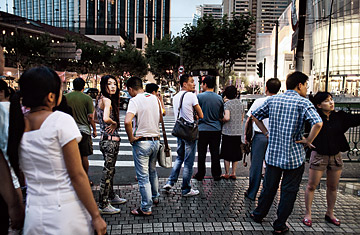
Unidentified Chinese shoppers wait at a red light before heading towards Plaza 66, a mall in the citys most exclusive shopping area, West Nanjing Road.
(2 of 3)
The speed and relative success so far of China's stimulus stands in stark contrast with that of the U.S. According to a recent study by the World Bank, Beijing's government spending will generate more than 80% of the country's overall economic growth this year. This is partly because China was already in the midst of a nationwide infrastructure program when the recession hit. Emergency spending measures simply added to existing schemes already under way. In other words, the projects really were shovel-ready, and the money hit the streets quickly — and in large dollops. Outlays on new railway construction, for example, were $41 billion last year. They will be $88 billion this year. Says one senior FORTUNE 500 executive: "In the U.S., NIMBY [not in my backyard] is still the order of the day, whereas in China it's more like IMBY. They build where they want, when they want. And they move fast."
China's recovery and growing economic importance have led some to suggest that global institutions such as the Group of Eight — the U.S., the U.K., Canada, France, Germany, Italy, Japan and Russia — are becoming obsolete; that the only dialogue that really matters going forward is the conversation between the "G-2": China and the U.S. On July 27, President Barack Obama appeared to acknowledge this when, addressing participants in high-level talks between the two countries, he said Washington's relationship with Beijing would "shape the 21st century." In recent months, Beijing has started to throw its weight around. China seeks — and will almost certainly soon get — greater voting rights in the IMF. In June, China agreed to buy up to $50 billion in bonds issued by the IMF to boost the fund's capacity to deal with the global financial crisis. Earlier this year, Chinese leaders, worried about the strength of the U.S. dollar and the safety of their own $763.5 billion investment in U.S. Treasury Department debt, called for the creation of an alternative to the greenback as a global reserve currency. More recently, Beijing has signaled an intention to slowly establish its own currency, the renminbi, as a dollar alternative in international trade by providing subsidies for Chinese companies to price their exports in renminbi. One economist, Qu Hongbin of HSBC in Hong Kong, goes so far as to say that 40% to 50% of China's overall trade flows could be settled in renminbi by 2012 (though few other economists believe this will happen anywhere near that fast). This willingness to make its positions known publicly and push other governments to see things China's way "is very different from 10 years ago, when Beijing was much quieter and more low-profile," says Jun Ma, an economist at Deutsche Bank in Hong Kong.
Indeed, China is increasingly open about both its ambitions and its concerns over U.S. economic policy, given its position as Washington's largest foreign creditor. Beijing never signed on to what became known in the late 1990s as the Washington Consensus on global economic policy, which called for free trade, privatization, light-touch regulation, prudent fiscal policies and — at least as many interpreted the consensus — free capital flows. The U.S. Treasury, in the wake of the credit meltdown, has put forward a plan to enhance regulation of its own capital markets, but that is unlikely to prevent Beijing from continuing to push for the IMF to take a greater role in policing global markets. At its core, despite embracing many aspects of the market, China runs a top-down, command-and-control economy, and its success so far in skating through the recession relatively cleanly may encourage other developing countries to adopt its brand of capitalism.
Not So Fast
still, the best possible answer to the question of whether China can save the world is: Not yet. Plenty of economists doubt that China's economy is as sound as it appears or truly on the road to a sustained recovery. And many more dismiss the chatter about China as the world's economic savior as hopelessly premature.
China's overall economic vigor may continue to impress, but there are questions surrounding the quality of its performance. The People's Bank of China, the central bank, is giving great gobs of money to state-owned banks that, with Beijing's forceful encouragement, are lending to state-owned companies participating in infrastructure construction. Skeptics are frightened by the amount of cash being shoveled out the doors. The central bank recently announced that new loans in June totaled $224 billion. That was more than double the previous month's amount and brought new bank lending in the first six months of the year to nearly $1.1 trillion, exceeding the total for all of 2008.
